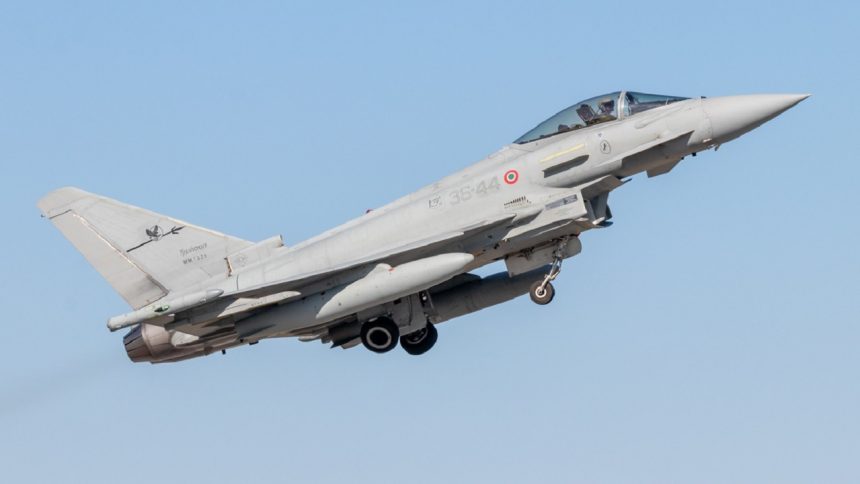The Ministry of Defense requested the government’s approval for the acquisition of the 4th tranche of the European fighter jet, effectively launching the acquisition process.
Shortly after the news of the cancellation of the 1.2 billion Euro KC-46 program, it appears that the Italian Air Force might finally acquire the long rumored new Eurofighter Typhoons. On July 4, 2024, the Ministry of Defense requested approval for the acquisition of 24 new Typhoons and the renewal of technical and logistic support for the entire fleet.
Details were not disclosed, however the document says the request will be evaluated by the Commission for Foreign Affairs and Defense and the Commission for Balance, with a decision expected by Aug. 13. This is the first step of the acquisition process, after which the parties involved will start working on the contract and more details will be released.
The acquisition of a new tranche of the European fighter jet by the Italian Air Force has been long rumored but never confirmed, until now. The program is expected to also act as a bridge to keep the assembly lines active until GCAP (Global Combat Air Programme) is ready for serial production.
As details were not released there are now two main rumors about the acquisition program: new aircraft which will replace the Tranche 1 Typhoons, the oldest in the fleet, or Eurofighter EKs. In both cases, the aircraft are likely to be in the same configuration of the latest acquisition by the other operators, possibly integrating also the Phase 4 Enhancements upgrades.
The Eurofighter Typhoon in Italian service
The Italian Air Force celebrated earlier this year 20 years since the arrival of the F-2000 (designated F-2000A within the Italian Air Force, in accordance with Italy’s Mission Design Series). The first aircraft was a twin seater TF-2000A which landed at Grosseto Air Base, on Mar. 16, 2004.
The arrival of the first Eurofighter 20 years ago marked the beginning of the “renaissance” for the Italian Air Defense whose manned interceptors force, at that time, was based on three different types: the F-104 Starfighter and two “gap fillers”, the ex-RAF Tornado F.3 and the F-16 ADF leased to support the air defense needs until the Typhoon was mature enough to take over the task.
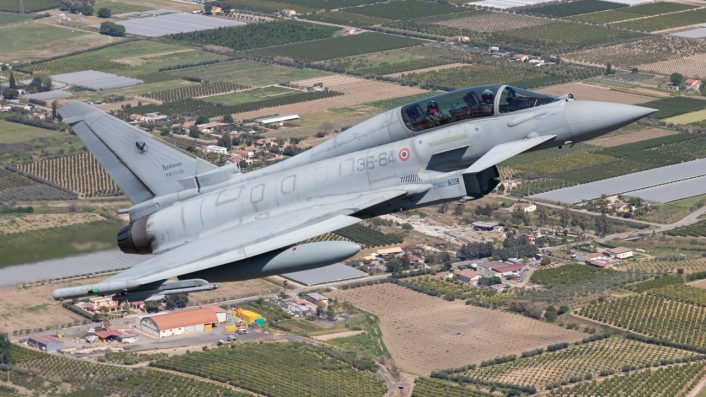
The first TF-2000As were assigned to the 20° Gruppo, the Typhoon Operational Conversion Unit, whereas the single seaters (F-2000A) were flown by the 9° Gruppo that carried out its first alert shift on Dec. 16, 2005, when, first among all the partner nations, the 4° Stormo undertook the first QRA alert duty with the new aircraft. Since then, the Wing has become the first to achieve the NATO Quick Response Force certification, has flown hundred alert scrambles, has supported NATO operations in Iceland and the Baltic States, and enforced NFZs (No Fly Zones) during several highly-sensitive events, including the Turin 2006 Winter Games and Davos World Economic Forums, and has also taken part to Operation Unified Protector, flying sweep and escort missions over Libya.
In 20 years, the Italian Air Force has logged more than 80,000 flight hours with the type, that now equips six squadrons (9°, 10°, 12°, 18°, 20° and 132° Gruppo) on four bases (Grosseto, Gioia del Colle, Trapani and Istrana) and supports round-the-clock QRA service both at home and abroad, and is regularly deployed where’s needed to carry out a variety of roles.
The Typhoon’s latest upgrades
The start of the acquisition process of the Italian Tranche 4 of the Typhoon happens shortly after the announcement of the German Tranche 5. The Italian aircraft should share the same configuration of both the latest German and Spanish Eurofighter, so let’s examine what we know.
The aircraft currently being produced are in the Phase 3 Enhancement (P3E), which is divided in multiple stages. P3EA is itself divided in five more increments under the National Development Programme. As a whole, this stage fully integrates the Brimstone air-to-ground missile and the Meteor air-to-air missile, as well as the Litening 5 targeting pod and an improved human-machine interface in the cockpit.
The Typhoon is also receiving new AESA (Active Electronically Scanned Array) radars to replace the older mechanical radars. Called European Common Radar System (ECRS), but also known as the E-SCAN AESA radar, the new radar has three variants: ECRS Mk 0, that equips the aircraft of Kuwait and Qatar; ECRS Mk 1, that is set to equip the Typhoons from Germany and Spain; ECRS Mk2, which will also have an electronic warfare and electronic attack capacity, currently being developed for the United Kingdom.
P3EB introduced the ECRS Mk 0, allowing for its E-Scan functionality, as well as increased multi-role features and the Sniper Advanced Targeting Pod. P3EC further integrates the ECRS Mk 1 radar and increased air-to-ground functionalities. Initially, this stage should have also included the ECRS Mk 2, but it was postponed.
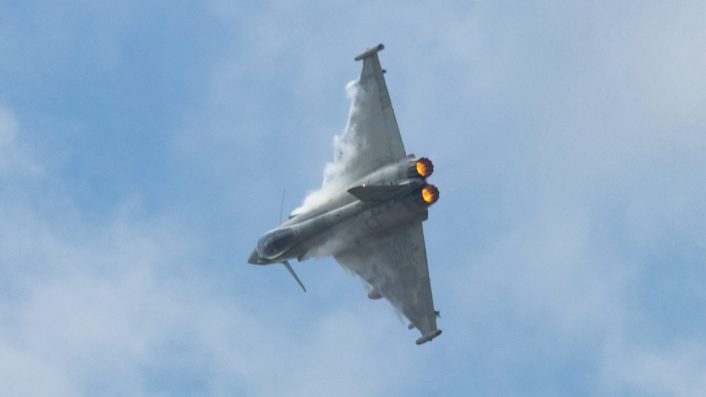
Eurofighter and the NATO Eurofighter & Tornado Management Agency (NETMA) announced in Jun. 2024 the development of the Phase 4 Enhancement (P4E). As the latest upgrade being developed, P4E is intended to take the Typhoon into the future, allowing it to stay relevant and integrate with 5th and even 6th gen aircraft.
Eurofighter says the P4E SD (System Definition) package contains a number of new developments, including an automated sensor management capability for all Typhoon radars. This will allow to exploit the capabilities of the new AESA (Active Electronically Scanned Array) radar to complete multiple simultaneous tasks, while reducing the pilot workload.
The package is also said to include an improved cockpit interface and enhanced Radio Frequency Interoperability (RFIO), which will improve survivability and lethality. While the development of a Large Area Display for the Typhoon has been confirmed, it is unknown at this time if it will be included in the new improved cockpit interface.
First step for the acquisition of 24 new Eurofighters for the ITA AF
The new EFAs will be at T5 standard aka NG (Next Generation) and progressively will replace the older T1.
Some NG features:
LAD
next gen mission computer
Captor-e Mk2
enhanced autoprotection
use of loyal wingman pic.twitter.com/wET6rt8OTx
— Ciro Nappi (@CiroNappi6) July 5, 2024
In addition to the automated sensor management capability, P4E will introduce DASS (Defensive Aids Sub-System) upgrades for all customers and includes the IOC (Initial Operating Capability) for the additional German electronic warfare capability.
The existing DASS, protects the Typhoon from threats including Infra-Red and radar-guided missiles. The system’s integrated sensors and jamming equipment deliver situational awareness to the pilot and equip the aircraft with a “digital stealth capability”, achieved through advanced electronic deception techniques.
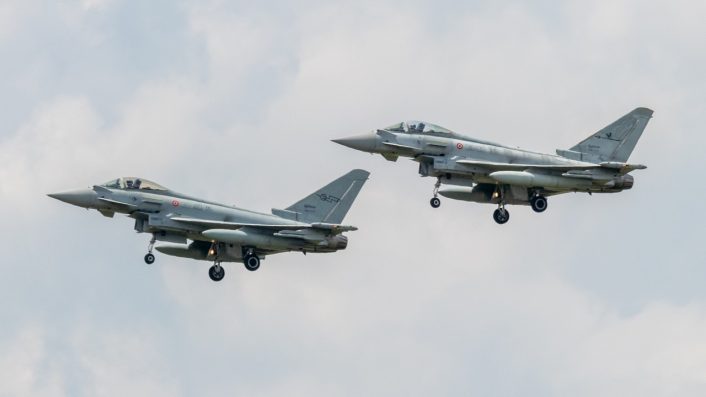
With P4E, the DASS will a number of new capabilities, including a digital receiver capability and an electromagnetic band extension, as well as enhancements to signal processing algorithms and processor capabilities. This will allow the Praetorian system to make the most of its integration with Typhoon’s E-scan radar options, says Leonardo, with the radar complementing the DASS’ on-board jamming with its electronic attack capability.
The Eurofighter EK
Germany is working on a dedicated Suppression of Enemy Air Defences (SEAD) variant of the aircraft, dubbed Eurofighter EK. In fact, Airbus will equip 15 German Eurofighters for electronic combat, which will be NATO-certified by 2030 and will then replace the Tornado ECR in the SEAD role.
Before the EK, Airbus announced a Eurofighter ECR variant, which was shown in 2019 at the International Fighter Conference. The configuration presented by Airbus back then showed the Typhoon carrying two Escort Jammer Pods, three 1000 liters fuel tanks and six MBDA SPEAR-EW air-to-ground missiles (currently being developed for the Royal Air Force), in addition to the standard air-to-air loadout of four Meteor and two IRIS-T.
Some artworks depicted also the capability to employ the AGM-88B HARM or the AGM-88E AARGM, while the Escort Jammer Pods were complemented by two Emitter Locator Systems installed into the Typhoon’s wingtips. It was also noted that the aircraft would have been a twin-seat aircraft with an Electronic Warfare Officer in the back seat whose cockpit would be independent from the pilot’s one.
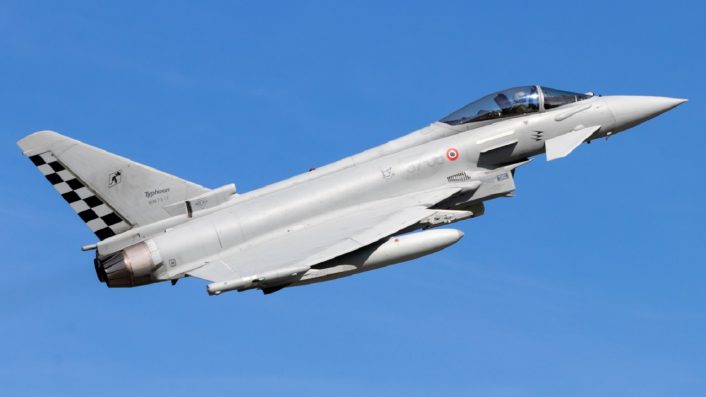
Airbus confirms that the Eurofighter EK will use the AGM-88E AARGM, a transmitter location and self-protection system from Saab and other technologies developed by small and medium-sized enterprises and a start-up. Notably, these include an AI solution that makes it possible to analyse radar data on-board and quickly determine precise self-protection measures. Moreover, the new artworks depict the Eurofighter EK as a single seater jet.
The sensor suite provided by Saab is the Arexis Electronic Warfare suite, which Saab said in June 2023 it was selected to equip the 15 Eurofighters, although an order was not yet signed at that time. Saab said that the German government evaluated products of European and international EW providers, considering aspects such as performance, integration and route to certification.
Arexis was first developed for the Gripen, although in a podded solution, equipped with high-power gallium nitride GaN Active Electronically Scanned Arrays (AESAs) and ultra-wideband receivers and Digital Radio Frequency Memories (DRFMs). Saab says it is capable of neutralising the Anti Access/Area Denial (A2/AD) bubble with support and escort jamming of modern “anti-stealth” radars, thanks to its capability to also transmit data from its sensors to allied network.
Arexis and the AGM-88E AARGM were exhibited with the aircraft mockup at ILA Berlin last month. Notably, Arexis was shown in the new pods which will replace the current wingtip pods of the Typhoon, as shown in the official artworks of the Eurofighter EK. The standard wingtip pods integrate ECM/ESM (Electronic Counter Measures/Electronic Support Measures) and towed decoys, but the presence of the latter on the Eurofighter EK was not specified.
Although the Italian Air Force has consistently stated that the F-35 will replace the Tornado ECR, some internal sources suggest the service might prefer to complement the valuable Lightning II aircraft with a Eurofighter squadron dedicated to the SEAD role. If this is confirmed, there is a possibility that at least half of the two dozen new Typhoons will be Eurofighter EK aircraft. We’ll see.

